

Profit
g Gen Munir states Fitna al-Khawarij has become ‘ home’ to all terrorist organisations and proxies of the world
g
CISLAMABAD
S TA F F R E P O R T
H I E F of Army Staff (COAS) General Asim Munir on Friday highlighted the impact of technology in spreading false information reiterating that unrestricted freedom of speech was leading to the degradation of moral values in all societies ” Gen Munir was speaking on the topic of “Pakistan’s role in peace and stability at the Margalla Dialogue 2024 in Islamabad organised by the Islamabad Policy Research Institute (IPRI) on Friday According to a statement issued by PTV on its X account, the COAS said, “Unrestricted freedom of speech is leading to the degradation of moral values in all societies He said that while technology had played an important role in the dissemination of information, the spread of misleading and incorrect knowledge was a major challenge”

“Without comprehensive laws and regulations false and misleading information and hate speech will continue to destabilise political and social structures, he said ‘TTP home to all terrorist proxies worldwide’
Supreme Court s Justice Muhammad Ali Mazhar on Friday stated that the apex court s constitutional bench enjoys the power to take suo motu notice after the enactment of 26th Amendment The top court judge made the remarks during the hearing of an anti-terrorism case after the petitioner s counsel Advocate Munir Paracha argued that no further action was needed in the case He contended that following the 26th Amendment, the Supreme Court no longer had the authority to initiate suo motu proceedings Justice Mazhar responded the lawyers clarified that while the amendment had brought in procedural changes it did not eliminate the apex s ability to take suo motu notice The procedure may have changed, but the Supreme Court still retains the power to take suo motu notice The only difference is that such cases are now heard by the Constitutional Bench ” he remarked Constitutional Bench is empowered to hear such cases and initiate suo motu proceedings if necessary SC judge Muhammad Ali Mazhar observed The bench, which included Justice Jamal Khan Mandokhel, also observed that any relevant issues could be addressed in future cases Justice Mandokhel further noted that the matter would be considered in the context of another case if it arises again
Furthermore, the six-member constitutional bench, headed by Justice Amin-ud-Din Khan, heard another case regarding granting the right to appeal to judicial employees Justice Jamal Khan Mandokhel remarked that making rules is the responsibility of the respective high courts and a petition cannot be filed under Article 199 Clause 5 The constitutional bench issued notices to the parties involved The constitutional bench also adjourned the LPG price fixation case until the second week of December directing lawyers appearing via video link to attend the next hearing in person at the Supreme Court in Islamabad Justice Jamal Khan Mandokhel remarked that two commissions had been formed in this case, and it was unclear under what authority the commissions had been established The constitutional bench disposed of the case related to appeals under the Banking Ordinance while the case of Al-Jihad
During his speech the COAS talked at length about how violent non-state actors and state-sponsored terrorism had become major global challenges Terrorism is a common challenge for all humanity globally, and Pakistan has an unwavering commitment to the
fight against terrorism he said He also stated that a robust border management system had been implemented to secure Pakistan’s border with Afghanistan against Fitna al Khawarij who he said was home to all the terrorist organisations and proxies of the world
Pakistan expects the Afghan Interim Government not to allow Afghan territory to be used for terrorism and to take strict measures in this regard ” Gen Munir reiterated In July the government through an official notification designated the banned Tehreek-i-Taliban Pakistan (TTP) as Fitna al Khawarij, while mandating all institutions to use the term khariji (outcast) when referring to the perpetrators of terrorist attacks on Pakistan Operation Radd-ul-Fasaad
The Chief of Army Staff stated that Radd-ul-Fasaad is an essential part of the National Action Plan, aimed at eradicating terrorism and extremism
Punjab declares emergency measures as smog tur ns into ‘health crisis’
g Pakistan will not participate in any global conflict, but will continue contributing to global peace and stability: Army chief LAHORE S A L E E
The Punjab government on Friday declared health emergency and three-day lockdown in Lahore and Multan, besides a series of emergency measures to mitigate the smog [crisis] turned into a health crisis Addressing a presser on Friday Punjab Senior Minister Marriyum Aurangzeb announced a series of emergency measures in response to the worsening smog crisis in the province, including the declaration of a health emergency and three-day lockdown in Lahore and Multan
Mrs Aurangzeb stated that a health emergency declared in Lahore and Multan and leaves of all doctors and paramedical staff has been cancelled while closure of schools and colleges has also been extended for one more week
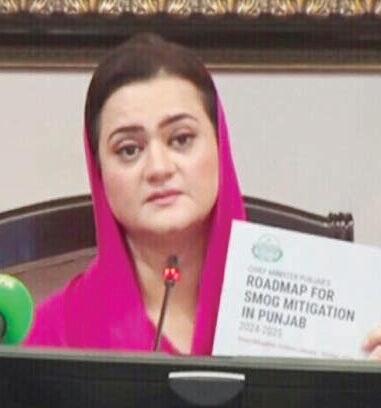
Due to the smog, schools will be closed for another week online classes will be held in colleges and universities Restaurants have been given time till 4pm however taking food from restaurants will be allowed till 8pm “A new campaign, named “Detox Lahore ” will be launched to address the smog crisis Restaurants will be restricted to takeaway
services after 4 PM and brick kilns and furnace-based industries will remain closed for a week Aurangzeb emphasized that smog is not a short-term issue, and the government is preparing 3month action plans to tackle the crisis over the next year She referred to smog as a national disaster affecting not just Lahore but also Abbottabad and Multan She emphasized the countries that curbed smog received a lot of cooperation from their citizens, urging people to stay at home on Saturday and Sunday She also highlighted the role of actors artists and the media in helping deal with the health menace
To all the detractors, I will urge them to unite against smog Considering all the circumstances the decisions will be implemented from next week the minister announced
Interior ministr y pens letter to PTA seeking ban on illegal VPNs
ISLAMABAD S TA F F R E P O R T The Ministry of Interior has penned a letter to the Pakistan Telecommunication Authority (PTA) to block illegal Virtual Private Networks (VPNs) highlighting increasing risks to national security and public morality VPNs are increasingly being exploited by the terrorists stated the ministry s letter
“Off



Govt to repair Neelum-Jhelum tunnel at Rs23b, plant offline for eight more months
Asia Ltd in Bangladesh, which is evaluating a similar acquisition Bank Alfalah has assured the Pakistan Stock Exchange that any further developments regarding the transaction will be promptly disclosed
Consequently, banks were expected to pay approximately Rs197 billion in additional taxes Despite these hurdles banks private sector lending is expected to improve next year with anticipated economic stability The government has also indicated a shift in its strategy for calculating ADR Starting next year, ADR will be assessed based on a fullyear average rather than a single-day snapshot on December 31 This adjustment is expected to encourage consistent private sector lending and reduce reliance on year-end performance

were trading in positive territory At the day’s end the market settled at 94763 64 points up by 571 75 points or 0 67% from the previous close of 94 191 89 points Market analysts attributed this bull run to non-stop buying by local funds following a sharp decline in interest rates coupled with growing economic optimism as the visiting IMF has raised no concerns over Pakistan s progress in meeting revenue collection targets An IMF delegation, led by mission chief Nathan Porter, is in Pakistan for a staff visit to review recent developments and assess the Extended Fund Facility (EFF) programme s
During his speech, Gen Munir emphasised the need for resolution of the Kashmir
according to
United Nations resolutions and the aspirations of the Kashmiri He also highlighted that Pakistan has consistently called for a ceasefire in Gaza and Lebanon and has provided humanitarian aid to Gaza and Lebanon multiple times Pakistan has always advocated for the establishment of an independent Palestinian state,’ the army chief added The COAS reaffirmed that Pakistan will not participate in any global conflict but will continue contributing to global peace and stability He also highlighted that in the interest of international peace 235 000 Pakistanis have served in United Nations peacekeeping missions, while 181 Pakistanis have laid down their lives for global peace under these missions Gen Munir further noted that Pakistan is a nation of 240 million people with nearly 63% of its population under the age of 30 and that the country is blessed with immense natural resources and has emerged as a leading agricultural producer globally The country also holds large deposits of rare minerals and plays a significant role internationally in freelancing He added that due to its rich resources, unique geographical location, and seaports, Pakistan is strategically crucial for trade with Europe Central Asia and the Middle East The Army Chief affirmed that Pakistan will always contribute positively to regional and global peace
Federal minister mandates crackdown on corruption in NHA with one -week deadline
ISLAMABAD
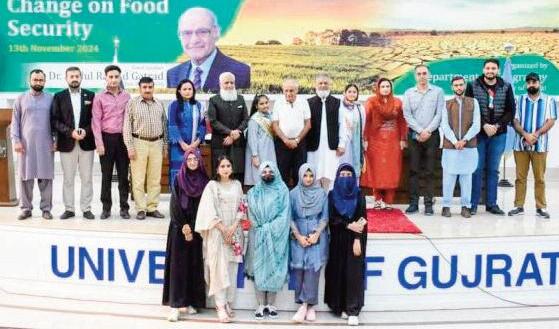





Agricultural income tax
Punjab becomes first province to legislate
COP 29: A platform
The other side of the pic ture
the leadership of the conference even, in the case of the UAE was placed into the hands of an
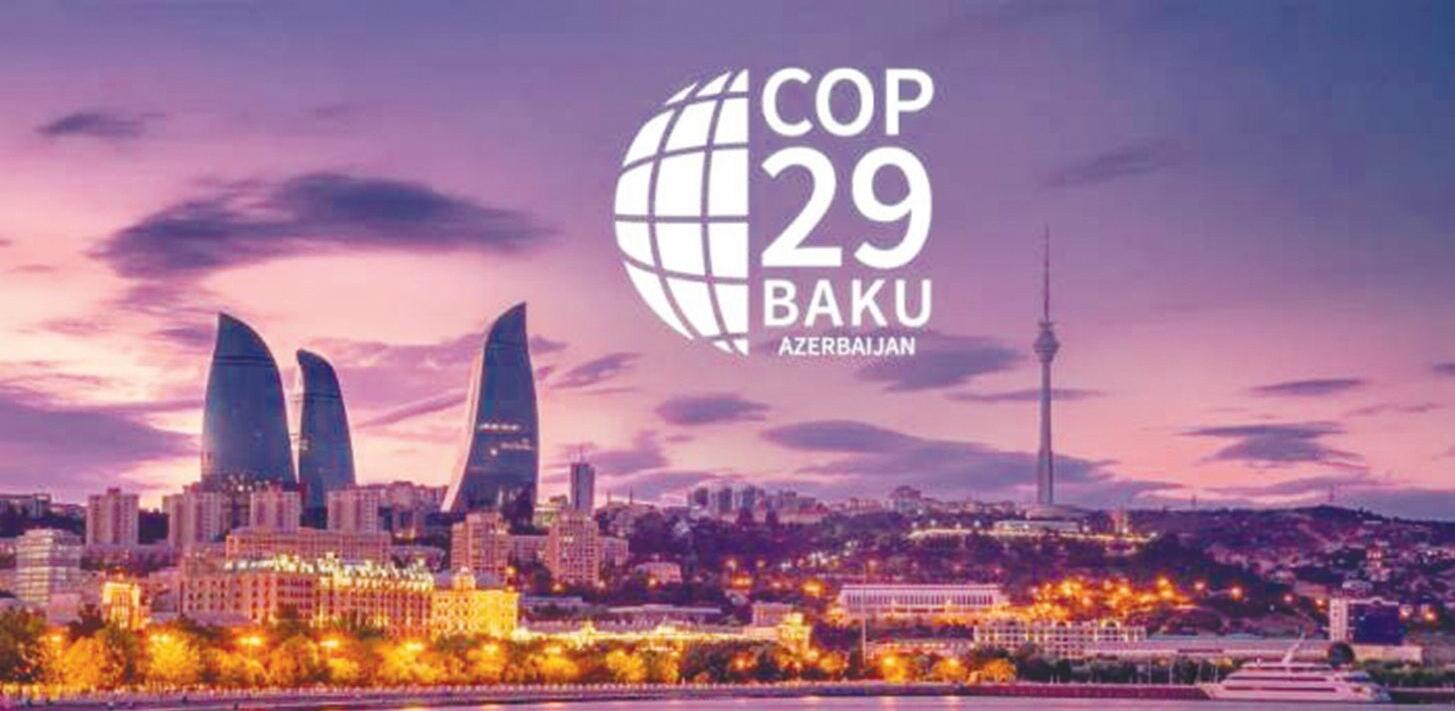

undertone Where in particular, at the conference last year the Arab leadership of the climate conference in their attempts to assert a climate agenda were often sidelined or undermined by others It is indeed ironic that
P a k i s t a n ’ s c o n s t i t u t i o n a l p r o m i s e s f o r
Enforcement and Challenges
Navigating Trump’s foreign policy


TH E treatment of minorities is a crucial topic because it shows a nation’s dedication to democracy human rights and the rule
and Article 25 provides for equality before the
while
36 and 37 ensure that the state will promote and defend the rights of
including their culture, language, and religion Notwithstanding these clauses, historically the legal system has discriminated against religious minorities and fostered an atmosphere of vulnerability Pakistan’s legal system has frequently marginalized minorities by imposing legal limits and selective enforcement of laws jeopardizing their social welfare access to justice, and freedom of religion
The most polarizing part of Pakistan’s legal system that affects minorities are the blasphemy laws which are outlined in sections 295-B and 295-C and related articles of the Pakistan s Penal Code
According to a 2023 Human Rights Watch report, religious minorities who comprise less than 5 percent of Pakistan s population, were the targets of about 40 percebnt of blasphemy charges By report 171 incidents of blasphemy were documented in 2023;
mara Mashal Khan and Asia Bibi a Christian woman accused of blasphemy Similarly, Abdul Ali was killed by a police officer while in custody in Quetta, highlighting the effects of these laws and their propensity to provoke mob violence and these episodes reveal a gravely concerning breakdown in the justice system Forced conversions and legal inadequacies particularly among young girls from Hindu and Christian families, are still a major problem, as seen by several incidents A 2022 research by the Center for Social Justice estimates that between 100 and 200 forced conversions take place each year Although forced marriages and conversions are illegal under Pakistan s Penal Code these rules are not sufficiently implemented A proposed anti-conversion law in 2021 was met with strong criticism and ultimately defeated Due to societal bias and religious pressure, legal proceedings frequently fail to deliver justice Often minority communities experience political marginalization which can restrict their capacity to participate in politics and have their voices heard It is frequently impossible for minority members to fully engage in politics alongside the majority Furthermore, party lists are used to fill minority-reserved seats in the National Assembly giving political parties authority over minority representation rather than direct minority voter choice In a recent report the National Commission for Human Rights noted that 80 percent of government jobs designated for religious minorities are low-paid, and that nearly half of these positions are still unfilled Minority students are disadvantaged by the biases that are frequently reflected in Pakistan s educational system The Center for Social Justice reported in 2023 that school curricula were increasingly featuring religious content that was discriminatory toward minorities Pakistan has taken a number of legal actions to support and defend the rights of minorities In 2014 the Supreme Court issued a historic ruling
ordering the government to create a strong national commission to further protect minority rights The Hindu Marriage Act (2017) and the Punjab Sikh Anand Karaj Marriage Act (2018), which safeguards the rights of Sikh and Hindu women in marriage and divorce in accordance with their traditions and rituals came after it Although it is an attempt to safeguard Sikh and Hindu personal laws they are not enforced nationally In a similar vein, the Protection of Communal Properties of Minorities Ordinance (2001), attempts to prevent unlawful occupancy or destruction to the communal properties (community centers places of worship) of minority communities Nevertheless despite certain progress key recommendations made by these laws have not yet been put into practice; minorities in Pakistan encounter institutional and systemic obstacles that prevent them from accessing justice; and law enforcement organizations frequently hesitate to act impartially in cases involving religious matters particularly when under pressure from religious organizations or local communities Because judges may be swayed by societal prejudices, the absence of minority representation in the judiciary also affects results by impeding the right to a fair trial
In order to address these problems inclusive legal reforms must be prioritized along with broader societal transformations toward respect and tolerance In Pakistan the well being and the rights of religious minorities are not merely legal concerns; they are intricately linked to the county’s identity, social cohesion, and global reputation To develop Pakistan we must urge religious leaders representatives of religious minorities and the media to inform the people about their rights and to promote interfaith harmony tolerance and unity
The writer is a Lecturer at Government College University Faisalabad (GCUF) Chiniot Campus He can be reached at Email: mehndiarslan@gmail com
In order to address these problems, inclusive legal reforms must be prioritized, along with broader societal transformations toward respect and tolerance. In Pakistan, the well being and the rights of religious minorities are not merely legal concerns; they are intricately linked to the countyÊs identity, social cohesion, and global reputation. To develop Pakistan we must urge religious leaders, representatives of religious minorities and the media to inform the people about their rights and to promote interfaith harmony, tolerance and unity.
Crisis in Lahore


TBreathing through the smog
Choking progress
with little accountability Agricultural practices particularly the burning of crop residue after the rice harvest in October and November add to the smog Farmers burn leftover stalks and straw to clear fields for the next planting season, releasing large amounts of smoke, particulate matter, and carbon dioxide This practice, driven by a lack of alternatives, not only affects rural areas but also contributes to urban smog as the smoke often drifts into cities worsening air quality The seasonal weather patterns also play a role in the formation and persistence of smog During the winter months, Lahore and other cities in Punjab experience a temperature inversion a meteorological phenomenon in which a layer of warm air traps the cooler air near the ground This phenomenon creates a situation where pollutants are trapped in the lower atmosphere, leading to smog formation Smog is made up of fine particulate matter (PM2 5) and other toxic gases, which are harmful to human health when inhaled Prolonged exposure to smog can lead to respiratory problems such as asthma bronchitis and even lung cancer It also increases cardiovascular diseases particularly among vulnerable populations such as children, the elderly, and those with preexisting health conditions The toxic air can irritate the eyes throat and skin leading to widespread complaints of discomfort and illness According to a report by the WHO air pollution in Pakistan particularly in urban centres like Lahore, is one of the leading causes of premature death, with thousands of people dying each year due to respiratory diseases linked to poor air quality Coupled to health issues smog has significant economic consequences The poor
air quality often results in reduced visibility which disrupts transportation delays flights at airports and increases the number of road accidents In Lahore schools and businesses sometimes close when air quality deteriorates, leading to loss of productivity The increased number of health-related issues places a burden on the healthcare system, further straining the country’s already limited resources The smog crisis not only affects the environment and public health but also has a detrimental impact on the economy Given the complex and multifactorial nature of the smog problem, addressing it requires a comprehensive and multi-pronged approach One of the most urgent steps is to implement stricter vehicular emission standards and improve public transportation The government must enforce stricter regulations on vehicle emissions, ensuring that only those vehicles meeting modern emission standards are allowed to operate Regular vehicle inspections, fines for non-compliance, and incentives for upgrading to more environmentally friendly vehicles are key steps in reducing vehicular pollution Investing in public transportation infrastructure such as replacing motorbikes with e-bikes/scooters, and promoting the use of eco-friendly transport options like electric buses and trains, could significantly reduce the number of private vehicles on the road In the industrial sector the government needs to tighten regulations and improve enforcement of environmental standards Factories, brick kilns, and power plants should be required to install emission control technologies, such as scrubbers and filters, to reduce the release of harmful pollutants Industries that rely on coal or other highemission fuels should be incentivized to switch to cleaner alternatives such as natural gas or renewable energy sources The government can also encourage the adoption of green
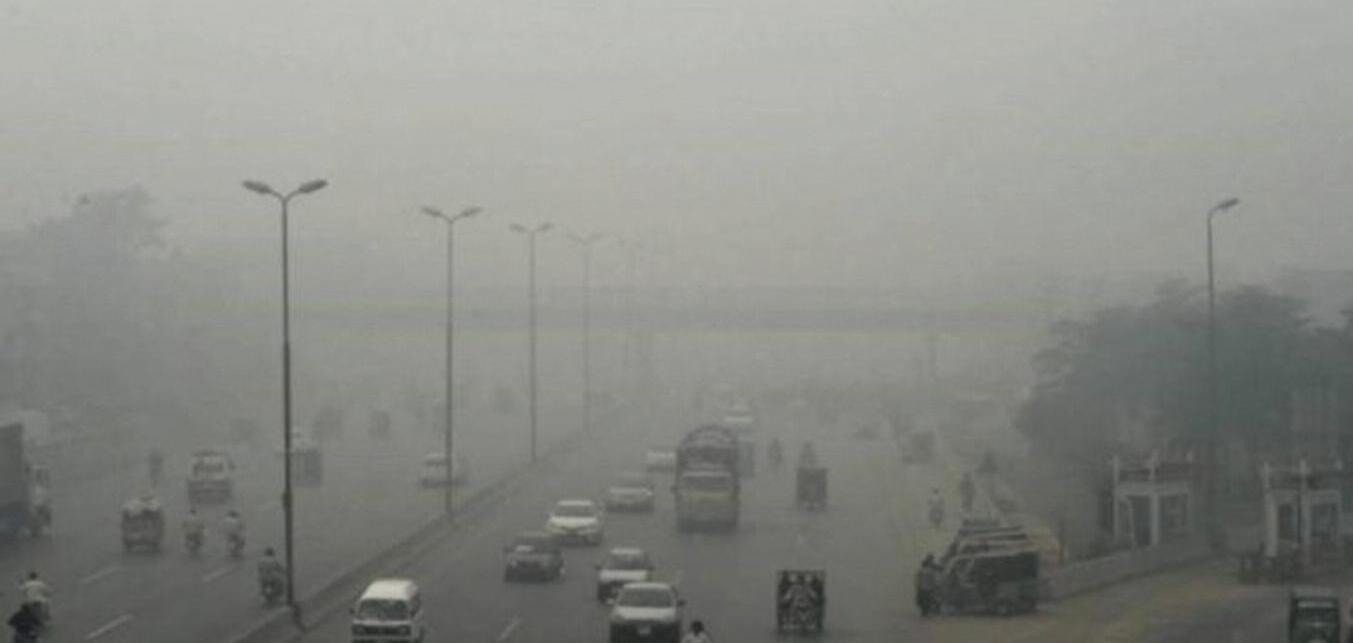
ter, sulphur dioxide, and carbon monoxide into the air These emissions are often poorly regulated and the lack of effective environmental monitoring and enforcement has allowed industries to pollute the atmosphere
Looking to global examples of success, cities like Copenhagen, Zurich, and Vancouver, which consistently rank among the best in air quality, offer valuable lessons. By coordinating with these cities and adopting their best practices, Pakistan can accelerate its efforts toward cleaner air. Only through collaborative action and a collective commitment to environmental sustainability can Pakistan hope to restore its skies, protect the well-being of its citizens, and build a healthier, more prosperous future for generations to come
India’s colonial occupation of Kashmir


BU I L D I N G on recent Kashmir scholarship this book is anchored in an understanding of Kashmir and its relationship to India as a colonial occupation and in particular foregrounds the role of a client regime in Kashmir in entrenching the colonial occupation Even though India is a postcolonial nation that emerged from British colonial rule, it has itself become a colonizing force Its colonialism is disavowed or ignored especially among postcolonial scholars of India There remains an attachment in scholarship to seeing colonialism as emerging only from the West to the Global South, in addition to situating our present moment as a decolonial one Both tendencies fail to account for power dynamics in the Global South and the ways in which (post)colonial nation-states are also enablers of imperialism or colonialism Colonizing Kashmir pushes back against such reductive understandings of colonialism and coloniality that see colonial powers and nation-states as being entirely different constructs arguing that it is precisely in spaces like Kashmir where postcolonial studies in its ambiguous spatio-temporality confronts its limitations especially given ongoing forms of colonialism Scholars have advanced the terms postcolonial colony, postcolonial informal empire, postcolonial occupation and third world imperialism to reflect how “formerly colonized nations assert their sovereign status through vociferous proclamations of territoriality and violent enactments of military might that have implications for both indigenous communities and stateless peoples within their borders who are denied self-determination One reason that these forms of colonialism remain obscure is that geographic contiguity and internal cultural cohesion disguise imperial or colonial dynamics Thus the fact that Kashmir is geographically contiguous to India creates the possibility for a less visible kind of colonialism than is possible overseas Recent Kashmir scholarship has contested triumphalist narratives of the postcolonial Indian nation by examining how colonialism imperialism occupation and settler-colonialism are all important analytics to understand India s relationship with Kashmir (and elsewhere) This book further develops our understanding of the modes of control used by the Indian government and its client regimes which have varied over
time underscoring the multiple trajectories and manifestations of colonialism occupation and settler-colonialism in Kashmir A number of the signature features of late colonialism, as recognized and theorized by leading scholars in the field, constitute Kashmir as a colony First, the denial of sovereignty and the absence of popular consent are integral to colonial formations In Kashmir the colonial nature of India s rule stems primarily from the fact that the state subjects of Jammu and Kashmir cannot be said to have ceded sovereignty to the Indian state through popular collective will The accession treaty signed by the maharaja, the formation of the Kashmir constituent assembly and elections in Kashmir are all identified as evidence of India s sovereignty in Kashmir However these events occurred in the absence of popular collective will with no consideration given (despite multiple UN resolutions calling for self-determination and a plebiscite) to the political aspirations of the people
The sovereignty claims of colonial states are also derived from the authority of [their] own particular narrative of history and identity Indian narratives hold Kashmir as being integral to India since time immemorial (especially given the construction of Kashmir as essentially Hindu), thus legitimating both secular and Hindutva claims over Kashmir Colonial rule is driven by territorial conquest largely for the purposes of resource extraction for the metropole and it relies on labor and explicit racial logics Resource extraction, especially of Kashmir s water resources, is an important part of India’s colonization, as is the racialization and exotification of Kashmiris in Indian imaginaries Colonial rule is also borne of strategic geopolitical interests Kashmir s pivotal location fortifies India s geopolitical interests with regard to Central and East Asia and also secures its geo-political hegemony in South Asia ” Nation-states like India also derive a more symbolic benefit from colonization Kashmir consolidates India’s identity as a nation-state: it produces nationalist consensus in its mainland which has served to maintain and reproduce India both territorially and symbolically as a secular nation (especially during the Nehruvian period) and a Hindu homeland In binding the nation together Kashmir can “be used to paper over the unfulfilled needs and demands of postcolonial India s own disempowered people
Another distinguishing feature of colonial rule is the presence of compradors, or native political elites that colonial powers utilize to facilitate effective forms of governance, especially in instances of indirect rule Indirect rule is often developed in response to demands for self-rule or self-determination by the colonized This comprador class in turn attempts to negotiate and gain from colonial structures Examples include Kashmir s client regimes, such as Bakshi s government, which helped reinforce Indian rule in Kashmir by demanding increased financial integration economic rights and educational access Far from denying the colonial logics inherent in the relationship these examples
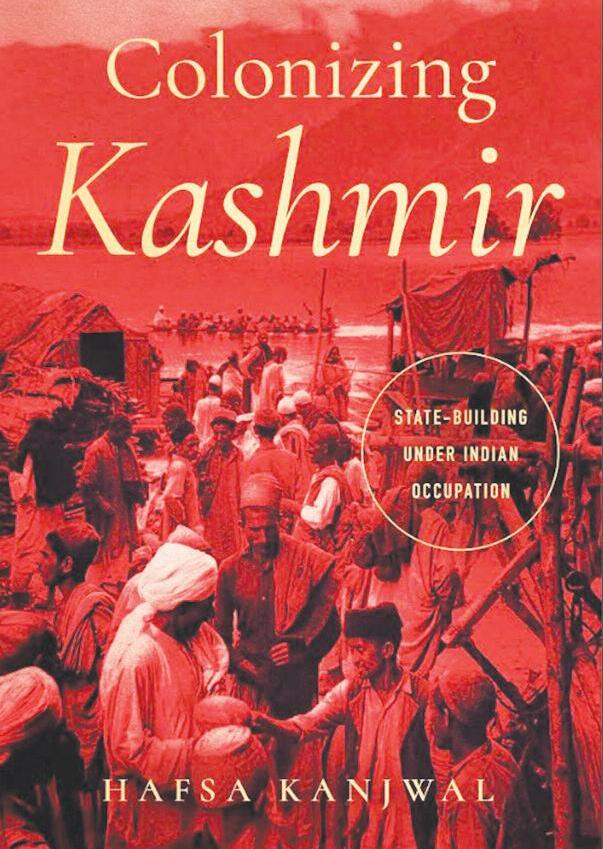
are evidence of colonial rule The demand for jobs, education, and greater representation (by the Congress and others) occurred under British colonial rule in India, too, and is widely understood as part of the colonial framework rather than a negation of it
Defining India s relationship with Kashmir as an occupation has been deployed by a number of Kashmir scholars, who have examined the ways in which occupation has been critical to the foundation of what is often touted as the world’s largest democracy The term occupation has its roots in international humanitarian law and refers to military control by a power over a territory that is outside its sovereign jurisdiction This control is meant to be temporary, until a permanent settlement is reached, and international law seeks to regulate the relationship between the occupier and the occupied Recent scholarship on occupation has problematized the very nature of occupation arguing that many occupations like Kashmir, remain outside the bounds of international law and are prolonged, not temporary, often resulting in processes that overlap with settler-colonialism (through land grabs and demographic engineering) as well as colonialism (through resource appropriation) Mohamad Junaid has argued that occupation is a process that involves concomitant strategies and practices, many of which operate in Kashmir Developing occupation frameworks in relation to Kashmir allows us to see how India’s occupation operates through illegitimate elections portrayed by the Indian government and its client regimes in Kashmir as exercises in democratic action and popular will (what Ather Zia calls the politics of democracy ) and preemptive detention of political opponents, as well as more spectacular forms of military violence and dispossession In addition particular forms of law and constitutionalism such as states of emergency are constitutive of occupations Haley Duschinski and Shrimoyee Ghosh argue that India s occupation should be seen as occupational constitutionalism, whereby legal
mechanisms and processes produce foreign dominance through annexation of Kashmir s territory and sovereignty after Indian independence These constitute a state of emergency and permanent crisis in Kashmir This occupational constitutionalism originates in Article 370 of the Indian constitution, which, the authors argue, was initially intended to form a constitutional framework of sovereignty and self-determination for the Jammu and Kashmir state but became a constitutional mechanism of incorporation in the Indian Union On August 5, 2019, the Indian government dismantled Kashmir ’s special status under Article 370, setting into motion policies intended to “carry out far-reaching changes to demographic and land-holding patterns Kashmir scholars have increasingly turned to the framework of settler-colonialism which focuses on the acquisition more of land than of labor and resources to understand “India’s escalating assaults on Kashmiri sovereignty ” These assaults include laws that enable Indian citizen-settlers to buy land and achieve domicile status in Kashmir (which in turn gives them voting and employment rights) and the Indian army to make land grabs, as well as providing Indian corporations opportunities for investment and resource extraction While some scholars have argued that settler-colonialism and colonialism are antithetical I situate settler-colonialism as a variant of colonialism and thus constitutive of colonial occupations Furthermore, Samreen Mushtaq and Mudasir Amin argue that settler-colonialism should also be placed within the framework of military occupation They describe the long history of settler-colonialism in Kashmir starting from 1947 as a shrewd combination of eliminationist and assimilationist tactics undertaken by India to erase the distinct historical and political context of Kashmir These tactics include what Mushtaq and Amin call “practices of memoricide”: “the erasure of history of one people overwritten by that of another in order to create a narrative over time that has appropriated local histories and people s notions of belongingness Settler logic removes such notions of belongingness in an attempt to construct a new identity, an identity that is inextricably tied to the settler state In particular both the Indian and Kashmir governments have attempted to erase from historical consciousness the involvement of the Indian state and Hindu nationalist militias in changing the demographics of the Jammu province from a Muslim to a Hindu majority For Kashmir ’s identity to be mapped neatly onto India’s “secular politics of inclusion,” violence against Muslims in Jammu had to be elided and ideas of a new secular Kashmir had to be propagated The Indian army s usurpation of territory especially of ecologically critical forestland, since 1947 also demonstrates the settler-colonial logic that has governed Kashmir Patrick Wolfe argues that settler-colonialism “is inherently eliminatory but not invariably genocidal and that elimination can also take place via assimilation This means that elimination logics are more than the liquidation of indigenous or colonized communities; rather in their positive aspect they mark a return whereby the native repressed continues to structure settler-colonial society Wolfe s main argument that we should see settler-colonialism not as an event but rather as a structure that is, “elimination is an organizing principle of settler-colonial society rather than a one-off occurrence is an important one for Kashmir It helps us understand how the Indian government has used assimilationist tactics as a form of elimination since 1947, especially in the context of a global decolonial moment where conventional killing would provoke condemnation from the international community including the United Nations as well as threaten India s position vis-à-vis its leadership in the Non-Aligned Movement Kashmiris, like all other colonized and indigenous communities, have resisted Indian sovereignty as well as Indian declarations of normalcy through practices of “refusal or everyday practices of rejecting externally imposed institutions of settler state sovereignty and asserting political orders that challenge settler logics of inclusion Four decades after accession, and especially during the Bakshi period, India’s (settler) colonial occupation primarily utilized assimilationist strategies Assimilationist policies what I refer to in this book as integration seek to erase the historical specificity and sovereignty of a given community and forcibly bring it into the fold of the settler state Decades of assimilationist policies still failed to bring Kashmiris into the Indian national fold leading instead to anti-colonial resistance in the form of the armed rebellion and the popular mass uprisings in the late 1980s Junaid situates this period of a military occupation” as an “ensemble of

Ctoms inspection and quarantine cooperation and increase trade in high value-added products The two countries announced they will jointly explore new opportunities for cooperation under the framework of the Belt and Road Initiative to achieve mutual benefit and win-win results and promote the sustainable development of the two countries China and Peru are also ready to cooperate on large-scale infrastructure proj-
Iran
tells
ects in accordance with their respective national laws the statement said It added that the countries believe the opening of Chancay Port is an important step for making Peru one of the world’s leading logistical technological and industrial centers and for strengthening Latin America s trade relations with Asia China and Peru are willing to incorporate projects in such emerging areas as circular economy, sustainable agriculture, industrial and supply chains, digital economy investment and green development into bilateral cooperation the statement stressed The two sides welcomed the establishment of China-Peru aviation links by Chinese airlines through code-sharing, cultivating the market for the launch of direct flights Stressing the importance of cooperation in artificial intelligence capacity building the statement said China and Peru will enhance the digital competitiveness of all people, especially vulnerable
IAEA
chief it
will negotiate but not under pressure

rhetoric that is “completely false and detached from reality” The report is the latest in a series from aid groups and international bodies warning about the dire humanitarian situation in the besieged enclave Human Rights Watch found that forced displacement has been widespread, and the evidence shows it has been systematic and part of a state policy Such acts also constitute crimes against humanity,” the report said Hamas denies that it uses civilians as human shields or hides fighters and weapons in facilities such as hospitals and schools The law of armed conflict forbids the forcible displacement of civilian populations from occupied territory, unless necessary for the security of civilians or imperative military reasons Israel invaded the Gaza Strip last year after Hamas attack in southern Israel killing around 1 200 people according to Israeli authorities and abducting more than 250 as hostages
DUBAI ag e n C e S Iran is willing to resolve outstanding disputes over its nuclear programme but won t succumb to pressure, its foreign minister told the UN nuclear watchdog head on Thursday as European countries push for diplomacy before Donald Trump s return to the White House
The ball is in the EU/E3 court Foreign Minister Abbas Araqchi wrote on X following talks in Tehran with IAEA chief Rafael Grossi, referring to three European countries –France Britain and Germany – which represent the West alongside the United States at nuclear talks
Willing to negotiate based on our national interest and inalienable rights, but not ready to negotiate under pressure and intimidation,” Iranian state media quoted Araqchi as saying I hope the other side will adopt a rational policy A senior Iranian official told Reuters that Tehran would send a
message to the three European powers through Grossi about Tehran’s seriousness to resolve its nuclear standoff while stressing that any pressure on Tehran would have the opposite effect Diplomats told Reuters on Wednesday that Britain France and Germany are pushing for a new resolution against Iran by the International Atomic Energy Agency board next week to pressure Tehran over what they view as its poor cooperation Grossi in a televised joint press conference with Iran s nuclear chief, urged Tehran to take steps to resolve the remaining issues
“It is in our power here to take concrete steps that will indicate clearly to the US and the international community that we can clarify things and move forward with concrete solutions Grossi said Grossi met Iranian President Masoud Pezeshkian for the first time since Pezeshkian was elected in July The president told Grossi that Tehran was prepared to cooperate with the IAEA to clear up alleged ambigui-
ties about Tehran s nuclear work, state media reported Trump’s return to office as US president in January upends nuclear diplomacy with Iran which had stalled under the outgoing administration of Joe Biden after months of indirect talks During Trump s previous tenure, Washington ditched a 2015 nuclear deal between Iran and six world powers that curbed Tehran’s nuclear work in exchange for relief from international sanctions On Tuesday Pezeshkian seen as relatively moderate, said Tehran would not be able to ignore its arch-foe the United States and needs to “handle its enemies with forbearance” Trump has not fully spelled out whether he will continue his maximum pressure policy on Iran when he takes office Relations between Tehran and the IAEA have soured over several long-standing issues including Iran barring the agency’s uranium-enrichment experts from the country and its failure to explain uranium traces found at undeclared sites
Book ‘K ar waan- e - Gojran’ launched to explore true Gojar histor y
LAHORE S ta f f r e p o r t
A launch ceremony of book: “Kar-
ambassador to the United Nations, Amir Saeid Iravani, on Monday, New York Times reported The New York Times citing two Iranian officials reported that Musk and Iravani s hour-long meeting held at a secret location in New York centred on defusing tensions
waan-e-Gojran ” a detailed work on the history of the Gojar community was held on Friday at Avari Hotel here under the patronage of Senator Chaudhry Jaffar Iqbal The book, written by Brigadier Chaudhry Sagheer Hussain and Rafiq Shahid, explores thousands of years of Gojar history and highlights their important contributions to human civilization The event was attended by historians intellectuals and members of the Gojar community The authors presented a new perspective on history, challenging the traditional accounts written by foreign writers Speaking at the event Brigadier Chaudhry Sagheer Hussain said: The book reveals the true history of the Gojar community For too long, foreign writers like the Greeks portrayed the history from their own point of view They often left out the truth colouring the facts and ignored depiction of the true picture in their accounts but Karwaan-e-

Gojran attempts to correct these ‘illusions and delusion’ by composing the full narrative of the Gojars and their rich heritage Dr Sajid Awan Director of the National Institute of Historical and Cultural Research (NIHCR), also spoke at the occasion He said “We have become used to learning history in a colonial style where others define our past This book is different because it tells the story from the very beginning of humanity and shows how the Gojar community played an important role in it Dr Awan added that the book offers a new way to understand the past free from foreign influence and
praised the authors for their hard work Senator Chaudhry Jaffar Iqbal showered the authors with praise for their meticulous efforts emphasizing that writing a book like this was not an easy task “It is a great contribution to preserving the history of the Gojar community which will ultimately inspire the future generations he lauded The audience which included many prominent members of the Gojar community, praised the book and the authors Many called it a proud moment for the Gojars and said the book will help people learn more about their roots and achievements



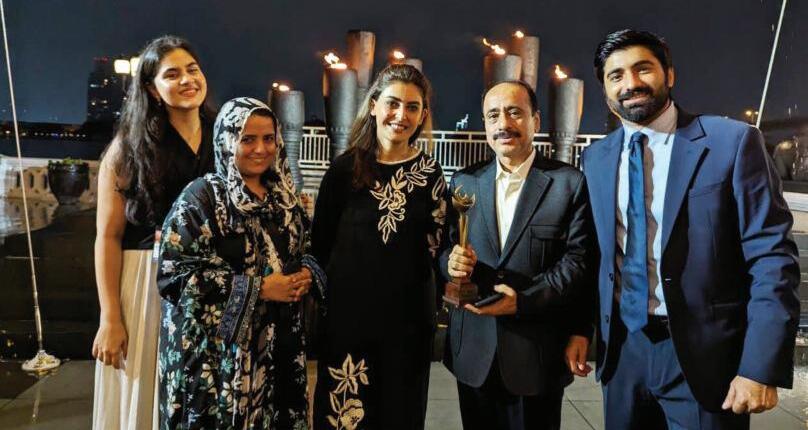



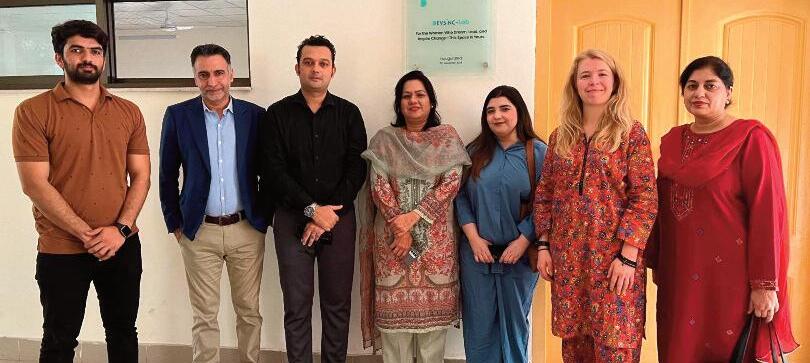

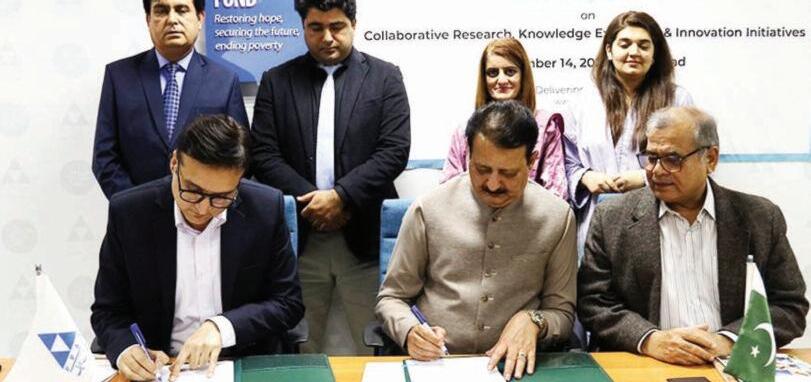


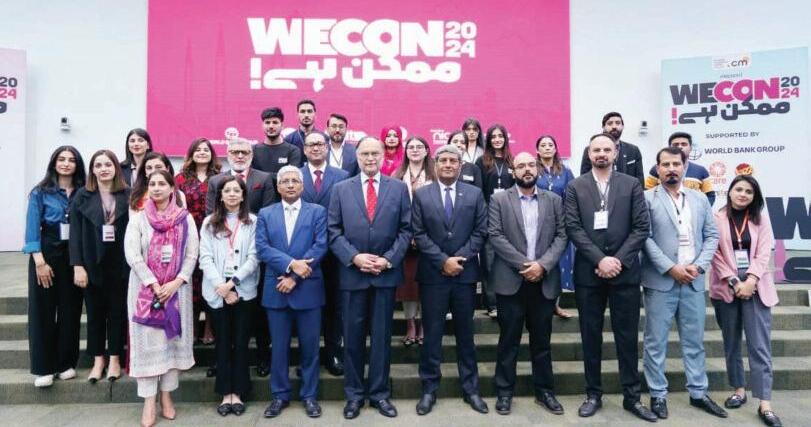

PAK , TURKIYE’S INTERIOR MINISTERS DISCUSS STRONGER BIL ATERAL COOPERATION
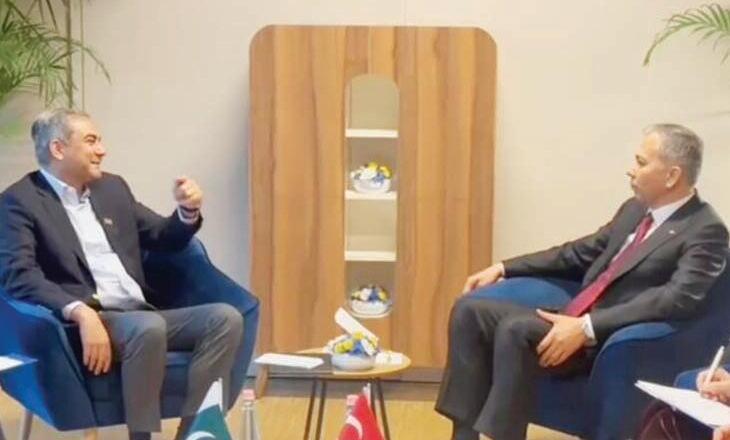
Pakistan, Spain discuss deepening diplomatic ties, collaboration on global challenges
A high-level parliamentary delegation from Spain s Senate Affairs

Committee engaged in extensive discussions with Pakistani lawmakers at a meeting hosted by Senator Irfan Siddiqui Chairman of the Senate Standing Committee on Foreign Affairs
The meeting underscored the shared commitment between Pakistan and Spain to deepen diplomatic relations and collaborate on a range of global challenges including disaster relief climate change counterterrorism and economic development
Senator Siddiqui warmly welcomed the Spanish delegation, which included His Excellency the Ambassador of Spain to Pakistan, acknowledging the longstanding and cordial diplomatic relations between the two nations
He expressed profound solidarity with the Spanish people in light of the recent devastating floods in Spain, noting Pakistan s own experiences with similar natural disasters Senator Siddiqui proposed enhanced parliamentary cooperation between the two countries with a particular focus on disaster preparedness, relief management, and rehabilitation efforts
“The catastrophic floods in Spain resonate deeply with us, as
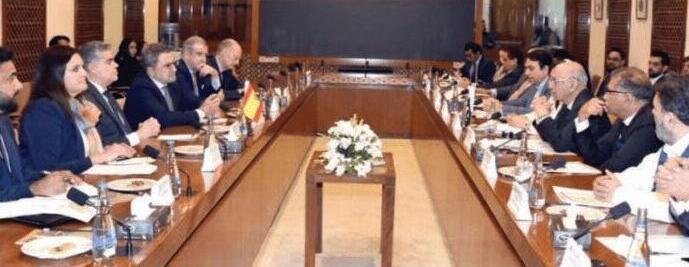
Pakistan too has suffered from the devastating impact of torrential rains and floods in recent years We stand in solidarity with the Spanish people during these trying times and seek to collaborate on disaster response strategies, said Senator Siddiqui
The meeting also emphasized the importance of parliamentary diplomacy in shaping foreign policy and fostering international peace and security Senator Siddiqui reiterated Pakistan s commitment to strengthening ties with Spain, specifically through joint efforts in multilateral forums such as the United Nations where both countries advocate for shared objectives including sustainable development human rights and conflict resolution
Through enhanced collaboration, we can address critical global challenges such as climate change, terrorism and economic instability and work together for a more secure and prosperous world added
Senator Siddiqui Additionally the discussion explored opportunities to bolster economic cooperation between Pakistan and Spain Senator Siddiqui highlighted the potential for increased trade, investment, and sustainable growth initiatives, alongside joint efforts in humanitarian assistance and development projects He also suggested the creation of joint parliamentary committees and research collaborations in key areas such as technology, renewable energy, and public health
The meeting further addressed the invaluable contributions of the Pakistani diaspora in Spain emphasizing the role of people-to-people connections in strengthening bilateral ties Both parties agreed on the need to enhance educational and knowledge exchange programs, ensuring that future generations of Pakistanis and Spaniards can work together in addressing common global challenges
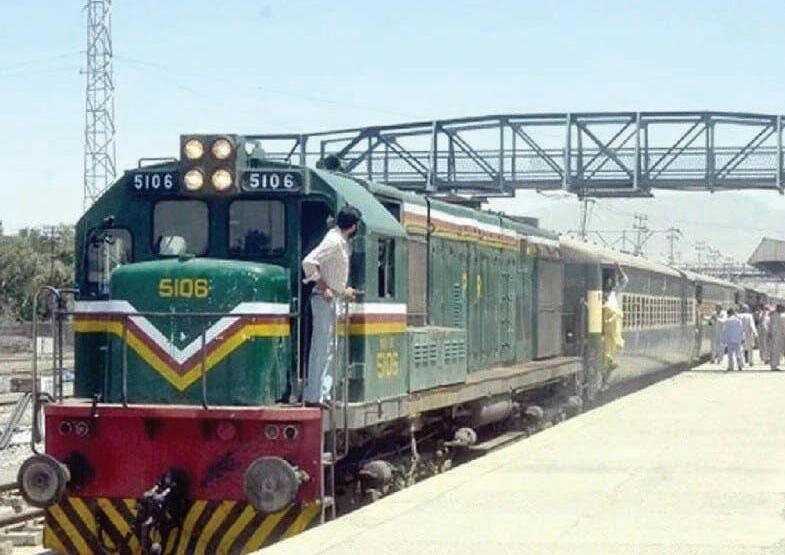
PESHAWAR S TA F F R E P O R T
Pakistan Tehreek-e-Insaf (PTI) Secretary Information Sheikh Waqas
Akram said on Friday that the PTI would take back its mandate stolen on February 8 during the party s scheduled nationwide protests on Nov 24 Speaking to media outside the Peshawar High Court (PHC)
Akram said his party leadership would try its best to take maximum people to the streets, adding that everyone including lawyers, traders, students and members of civil society should join the PTI’s protest against the government
“Most of our workers reached the D-Chowk on our last call for protest despite 35-hour long shelling he claimed Speaking about former first lady Bushra Bibi s participation in the protest, Akram said if a wife joined protest for the release of her husband, it isn’t called politics adding that few relationships were above politics Earlier Justice Syed Arshad Ali conducted hearing on Akram s pleas seeking transit bail PTI Punjab leaders to meet in Peshawar: Meanwhile, the Pakistan Tehreek-e-Insaf (PTI) leaders from Punjab held a meeting in Peshawar which was chaired by its Chairman
Barrister Gohar at Khyber
Pakhtunkhwa CM House According to media reports Khyber Pakhtunkhwa Chief Minister Ali Amin Gandapur also attended the key party meeting The sources said that PTI Punjab chapter President Hammad Azhar was also in attendance at the meeting There were earlier reports that the Punjab leadership of PTI was planning to hold meeting in Peshawar to avoid arrests Senior PTI leader Sheikh Waqas Akram also confirmed that the leaders from Punjab would hold the key huddle in Peshawar as they faced difficulties in holding meeting in their own province
